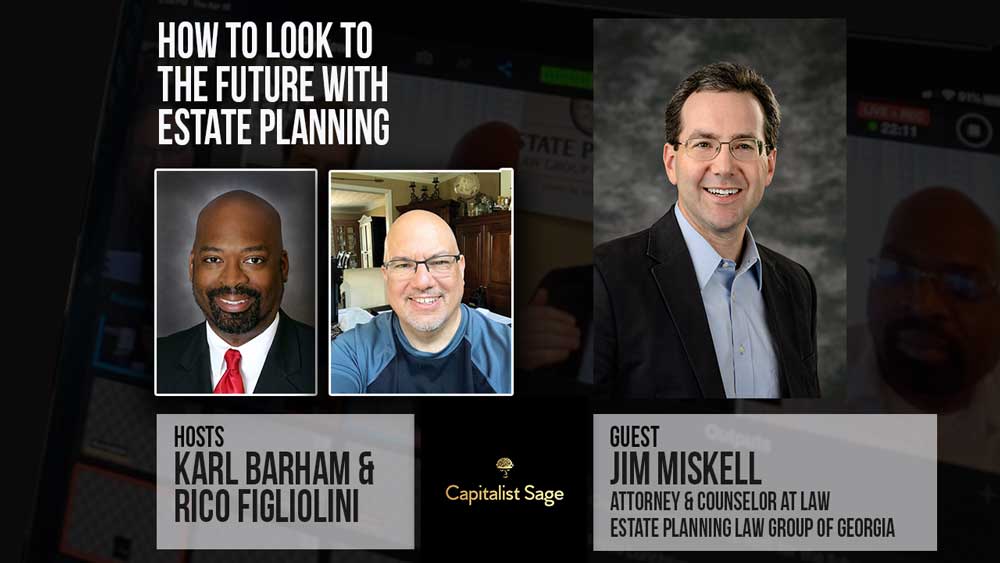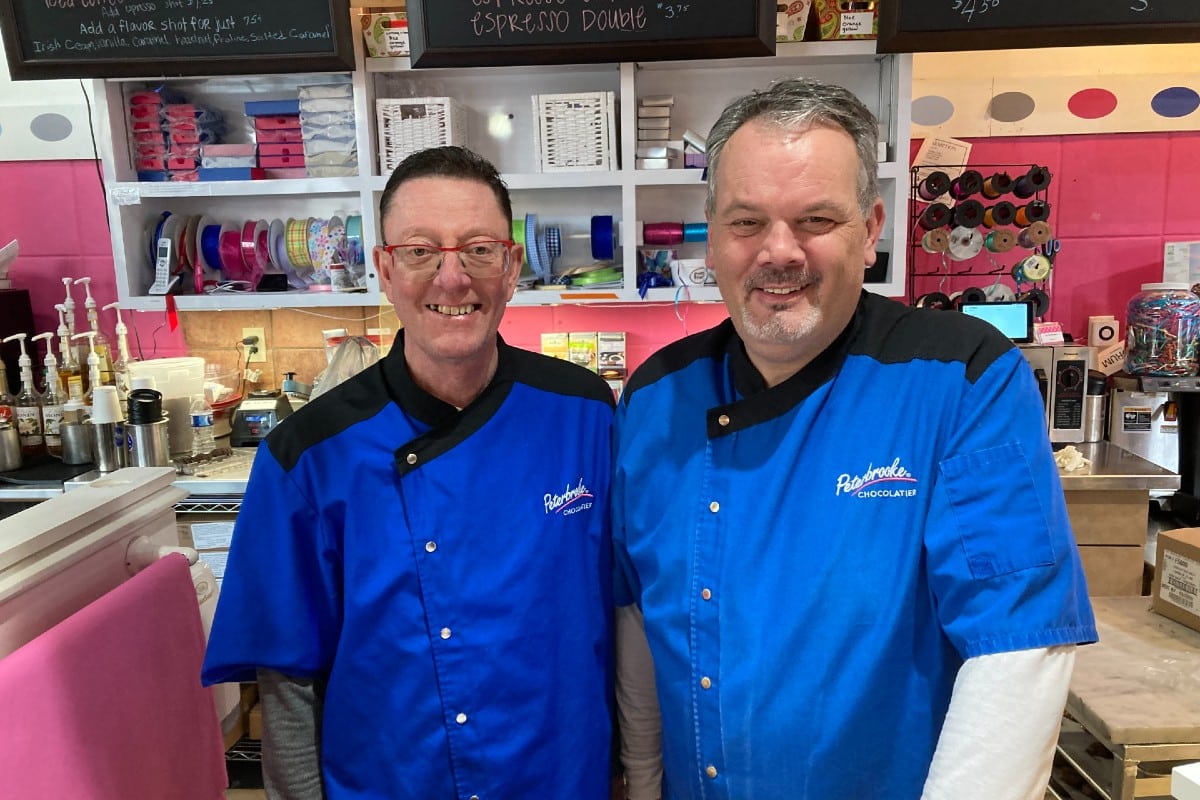Business
Capitalist Sage: How Estate Planning is More Important in the COVID-19 World [Podcast]
Published
4 years agoon

The hardest part may be imagining the world without you in it or without a healthy and capable you in it. There’s never a better time to start thinking about estate planning than right now.
No matter who you are as a business owner or individual, planning for the future is an important step. In this episode of Capitalist Sage, Rico Figliolini and Karl Barham are joined by Estate Planning Attorney Jim Miskell. Listen as they discuss all the details you need to know to start planning now.
Resources
Website: LetsTalkEstatePlanning.com
“The reasons to do it are, and I’m sort of joking that if you don’t do it, somebody else will. That’s really the heart and soul of it. If you want to control how what you’ve worked so hard to build, benefit your family in the future. Make the plans.”
Jim Miskell
Timestamp:
[00:00:30] – Intro
[00:01:59] – About Jim and Estate Planning
[00:05:58] – Risks and Benefits
[00:08:41] – What’s Entailed
[00:11:21] – For Business Owners
[00:14:14] – Why doesn’t everyone do it?
[00:16:30] – Sheltering
[00:19:22] – Navigating Partnerships
[00:22:59] – Starting the Conversation
[00:28:32] – Younger Estate Plans
[00:30:17] – Closing
Podcast Transcript
Karl: [00:00:30] Welcome to the Capitalist Sage podcast. We’re here to bring you advice and tips from seasoned pros and expert to help you improve your business. I’m Karl Barham with Transworld Business Advisors, and my cohost is Rico Figliolini with Mighty Rockets Digital Marketing, and the publisher of the Peachtree Corners Magazine, which is out.
Rico: [00:00:54] Yes, in most places. And if you haven’t received it, let me know, but it should be out there in your mailboxes. And I, you know, while we’re doing this, we’re going to obviously, we’ve been getting some technical difficulties. So bear with us as well. Everyone’s on, everyone’s online, so it’s the world out there, right? So I might as well introduce our sponsor Hargray Fiber. They are, in fact, they’re doing a great job those guys, they’re in the Southeast. They’re doing work with many small companies, midsize companies, and enterprise larger companies as well, providing internet services. IT management services as well, and they’re doing several promotions. And right now they’re there to be able to help you work remotely and collaboratively for free. So reach out to them at HargrayFiber.com and find out the sources, the solutions they have for you, and it’d be a great place to be. Thank you Karl for letting me do that.
Karl: [00:01:59] Absolutely. Well, let’s get right into it. I am so honored to have our guest today, Jim Miskell, who is an attorney, an estate planning attorney that has offices both in Johns Creek and Lawrenceville, Georgia. I got a chance to chat with Jim a couple of times. And he just was a wealth of knowledge in the area of estate planning, in ways that people may not have realized. So we wanted to have him come on today to talk a little bit about what all these business owners that are going through. This may be a good time through all the business owner that are going through. Sit back and think about some of the things that they should be putting in place to help protect their legacy as they go forward. So with that, I’d like to welcome Jim Miskall. Why don’t you introduce yourself and tell us a little bit about yourself, Jim.
Jim: [00:03:03] Thank you, Karl. Thank you, Rico. It’s pleasure to be here. Always appreciate the opportunity to speak to people about the importance of estate planning. Our practice is estate planning and elder law as you said Karl, we’ve got two offices, Lawrenceville and Johns Creek. Of course now, with the way things have been the last little bit, the physical offices are a little bit less important. We’re doing the entirety of our meetings with clients remotely, either by phone conferences, facetimes, zoom, some other mechanism of that kind. Signing ceremonies for our plans we’re handling in person, usually in the parking lot so that everybody stays safe and socially isolated. But we get those documents witnessed and signed. We offer estate planning services from folks that may not even think they have an estate. An estate plan that’s for rich people. No, if you’ve got spare change in a jar on your dresser. You have an estate. And it’s worth planning for. So we have clients that range from young couples who just had their first child to older folks. We do a lot of elder law planning for long term care benefits, which might be Medicaid or VA benefits. We handle the aid and attendance, preparation to be qualified for that. And so along that we’ve got some clients for which we do will plans, some clients for which a revocable living trust plan is the way to go. Some folks that in conjunction with those things, use an irrevocable living trust that gives them asset protection. We’ve used that not only in the areas of elder law, but also for clients who own small businesses. Because it gives a, an additional
layer of asset protection that you don’t get with just an LLC or a corporation. You can still retain control and income interests in your business. So for some folks that that’s a really good fit. It’s an area of practice that I love. I started out my career 12 and a half years as a prosecutor. And left prosecution in 2005 and realized pretty early on I wanted to focus on this area of practice because I noticed that the folks that were coming in for estate planning. Only came to see me for one reason, and it wasn’t because they were mad at their spouse and it wasn’t because that’s so-and-so who had a store in the same strip mall. Their clients were parking in their parking spaces. It wasn’t because they were mad at anybody. It wasn’t because they created a bad situation by committing a crime. It was because they loved their family. My clients only come to see me for one reason. That’s because they love their family and they’re trying to avoid problems in the future. And for a small business owners really fall into that category because they work so hard. They work so hard, and those with foresight don’t want that work to be lost.
Karl: [00:05:58] So Jim, let me ask you. That’s one of the things that I realize, you know, every day a small business owner is really busy running their business. And during this time of the pandemic, there is a pause for a lot of people where they have time to think about the future. And it’s becoming really real. And I see that in the conversation with people and people love their families. Why should someone than, consider putting together an estate plan. What are some of the risks they have out there if they choose not to do that or delay it too much longer?
Jim: [00:06:34] Well, the great thing about estate estate planning is that it’s optional. And if you don’t do it, if you don’t make the decisions for you and your family. Somebody else will do it. So if you’re comfortable with somebody else making those decisions and handing over control of those things and letting somebody else, another family member, or hopefully not a judge, make those decisions, then you bypass estate plan. Say, it’s not for me. That doesn’t fit the profile of most small business owners. As you say they work so hard every day. And we were talking earlier, I think Rico made a remark that we all see ourselves as the star or the lead in our own movie. And I think that’s especially true for small business owners because the person that picks up the trash, the person that cleans the bathroom and sweep the floors. You’ve done that job. You can do that job. People that are in the clerical and answering the phones. You could do that job and it needs to be done the way you want it to be done. Estate planning, the difficulty to get small business owners to do it is realizing that it’s something that needs attention. The reasons to do it are, and I’ve sort of joking that if you, if you don’t do it, somebody else will. That’s really the heart soul of it. If you want to control how the, what you’ve worked so hard to build, benefits your family in the future. Make the plans, make the plans. One of the things, that is a great opportunity in the time we’re in right now is it is giving folks the pause as you said, Karl. That, you know, you’re not on, on, on, and it gives you a minute to think, you know what? Tomorrow’s not guaranteed for me any more than it is that person across the street or the person I heard about on the news.
Karl: [00:08:21] So when folks introducing estate planning, how do you describe what it is? What, what’s entailed in estate planning? What does that actually look like?
Rico: [00:08:35] And, you know what, make a comparison to someone’s will because some people think they have a will and that’s good enough.
Jim: [00:08:41] Okay. A will is a good concrete place to start with estate plan, and that’s that. That’s a great, great place to start. Every estate plan needs to take into account a couple things. And the will does covers one of those bases as, who gets your stuff when you die? And that’s all well and good. The will says this is what happens, but the will is a death document. What I mean by that is it doesn’t do anything for anyone while you’re still alive. The person, you make your executor, they don’t have any authority while you’re alive. You can get sick, be in a coma, be critically ill. It doesn’t give them any authority to do anything for you. So what are you, how do you cover that disability portion, which is also really important state plan. That’s where we’re talking about powers of attorney and healthcare directors at the basic level. Powers of attorney allow you to extend your power to someone else to act for you when you cannot while you’re alive. So you can designate who is it that runs the business if you’re not able to be there. If you get laid up, collect an Aflac or your disability insurance, who’s going to the office and making sure that things get done to your specifications? The beautiful thing about power of attorney is you get to select the person that does that. I have a lot of folks and it happens with elderly folks and it happens to detail, with detail oriented, driven people who may be A type, they get to the power of attorney and they think, Oh, I don’t want to do that cause I’m giving up power. I’m giving up my independence. In the elderly folks, that’s a big issue also with business owners. I don’t want to give up any of that authority. The beautiful thing about power of attorney is you don’t give up one wit of authority. You’re just extending your authority to somebody else to act for you when you need them. So at base you need somebody, you need to think about not only may I just, not only is there a possibility the eventuality that you’re going to die. But I may not be well and able and competent the day I die. I may have dementia, I may have a head injury. I may have something that makes it difficult for me to do the things that need to be done. You need to address that as well. So the estate planning really needs to cover both of those situations. Because your estate can be squandered, misused, lost, argued over in either situation, you can prevent all those things from happening with planning.
Karl: [00:11:21] But can I ask a question? You mentioned a couple of things. We said the term will, and we said the term power of attorney. So within the state plan, what are some of the other documents and or devices or tools that are used that makes up a good estate plan for most people that might own a business, for instance.
Jim: [00:11:44] So for most people that own a business or even folks that have, some accumulated a state, a great option for many folks is a revocable living trust. A revocable living trust has a couple strong advantages where you hear about it most, and you may hear Susie Orman on TV on the PBS thing, or she says, you got to have a living trust. You’ve got to stay out of probate. Well, she lives in California and I, if we lived in California, I would say, yes, absolutely. You got to stay out of probate, Georgia probate, we’re very fortunate. It’s less expensive and less onerous, than probate in other States. But at the same time, it’s a court process by which your executor has to prove that the will is valid. And to do that, he has to
present it to the judge. Your executive has to show it to all your heirs, whoever would inherit from you, if the will is no good, get them to sign off or they can raise a complaint. Your executor can act for 30 to 45 days at minimum after that petition for probate is filed. To avoid that, you can build a revocable living trust. And the idea here is, isn’t that great with the retirement accounts where you can set a beneficiary designation? Isn’t that great with insurance? You just write down who they’ll pay and those companies are bound by contract. When you die to pay who you told them to, you don’t have to go through that probate process. I wish we could do that with my house. How am I, how can you do that with the house? You build a revokable living trust. It’s your own designated beneficiary machine. Every trust has three people involved as the person who makes it. That’s the set lore in Georgia. It’s got the trustee, that’s the administrative person. They have the rulebook and the checkbook. They have to manage the assets and they can write checks to the beneficiaries when the rule book says it’s okay. With living trust, you’re all three. You build the trust, you put your stuff in it, you remain the trustee as long as you’re able. When you’re no longer able, this is a great question, who’s trustee when you can’t? Whoever you pick. In the order you pick them. And they’re not just flying by the seat of their pants like they would with the power of attorney. Power of attorney’s long on powers, but it doesn’t have any instructions in it. It says, if I get in trouble, and I can’t do it, you can go do my banking. Well, how do I do that? Well, just go, go do my banking. A trust can be very specific. This is how I want you to run the business. This is how I want you to distribute the quarterly earnings. This is how I want it. You can make a rule book very specifically with the trust.
Karl: [00:14:14] Why do you feel that more people, that sounds pretty, pretty simple to understand. What do you see as the barriers where a lot of folks choose not to do that? And I’m going to put aside any myths and perception around cost for a second, but that seems like a more sensible way for someone with assets like businesses or considerable to handle that.
Jim: [00:14:41] Well, that’s, that’s a great question and a lot of folks, when we’re doing a webinar or a live presentation, folks ask me that question. Why doesn’t everybody do this? Well, I don’t know, but I can tell you a story about a client that I spoke with last week who had done a will plan with us 2014 maybe. And was just calling up to check and have sort of a, a little checkup. He’d been, had seen some of our online content and gone through the education process again and he had a lot of questions about revocable living trust. He said, well, that’s definitely for us, and definitely the surviving spouse, one of us dies, the surviving spouse is going to go do that. I said, well okay. That’s a plan, but what if you’re both in the car? He said, what do you man? I said, well, what if you get killed and she gets a head injury? She can’t do it. He said oh, yeah. I said, well why would you want to make a grieving spouse have to redo your estate plan after one of you dies. When you guys can set up now? So I don’t know. There’s an inertia to it. There’s a resistance, and I think there is a perception that that’s for rich people. And that, Oh, it’s complicated. When it’s actually simpler. It is more complicated to set up. It takes more work now. I don’t think the answer is that people are lazy, but everything that you do, setting up your revocable living trust takes pressure and work off your agent when you die. It’s things the executor would be doing later with a little plan. You do it now so that the T’s are crossed and the I’s are dotted and things weren’t run very smoothly for the family. I don’t know why people don’t
do it all the time, but I do know that very often the folks that do it say, I don’t want my kids having a fool around with that other stuff when we can make it really easy for them right now with a little extra work.
Rico: [00:16:30] Let me ask you something, doesn’t it also shelter the assets of an estate though. Doesn’t it shelter it from taxes and all that, as well? Doesn’t it provide some protection for family inheriting, if you will.
Jim: [00:16:46] The a, I’m going to give you the lawyer’s answer is it depends. A basic revokable living trust? No, it’s transparent. It’s like a see-through entity. The way you might think about a S election on a corporation or LLC where it flows through everything that happens there. The basic rule or the way I explain asset protection and the way I think of it is asset protection is based on the principle, that anything that I can get for me they can get from me. If I can get it for me, they can take it from me, so if I run over your foot in the Kroger parking lot, I got $15,000 in my pocket, you’re going to be able to get it. So to build a trust that gives you asset protection and the rule that that trust must have, and it must be irrevocable, is that whatever you put in that trust, you can’t get back out for yourself. So you can build a trust that gives you asset protection. But it’s a different mechanism and you would never put everything you have in a revocable trust only what you reasonably calculate. You’re never going to have to spend on yourself during your own lifetime.
Rico: [00:17:56] Or is it property that you not selling? So some, I know from my family up in New York, New Jersey, some of them have estate plans like this where property is in it. Because the property’s not going to be sold. It’s something that they feel it’s going to be out there for the rest of the family. So stuff like that, I guess. Those types of assets probably.
Jim: [00:18:16] Sure. Residence is a great first, first thing you would think of. That’s the prime candidate, and the beautiful thing is you might even be able to be trustee of that trust. You can’t violate the rules. You can’t sell the house and put the money back in your account. But you could as trustee sell that house and buy a condo on the 18th fairway in Myrtle beach. Yeah. All inside the trust. So you may not give up control, but you’d give up your ability to benefit from it. And you might set it up to where even though you can’t take money out for you, you could take money out for your kids. Pay tuition. Yeah.
Rico: [00:18:54] So there are good advantages for a business owner to really like, really think hard about doing this.
Jim: [00:19:00] Oh, absolutely.
Rico: [00:19:01] You know, just waiting. Okay.
Jim: [00:19:03] Another place that it really appeals. Is that idea of crossing the T’s and dotting the I’s myself. I’m gonna make sure this thing runs right, because I may be, I may think I’m
George Washington some point in the future, but I’m going to get this thing right today. So even my knuckleheaded brother-in-law can’t mess it up.
Karl: [00:19:22] So you brought up the topic of children. And so I got to think about succession planning in business. Not only when it’s children, but also what if there’s partners that are not part of your family? What role does estate planning and helping people navigating exits when there’s a partnership in a business. Where does that end and where does something else begin from the business side?
Jim: [00:19:48] Yeah. I see it as a slow transition where you can’t even tell where the business planning and the estate planning ends. I don’t know that there’s a hard and fast line. One of the things, an idea to get used to in estate plan, and I think also business succession planning is that it’s possible to separate control from benefits. You may want your spouse to continue to benefit from the business after you die, but your spouse has never worked in the business, so you don’t want her running it or him running it. So it’s possible to separate those two things, which are very often it’s children. There may be one child that has worked in the business and three children that haven’t. You may want them all to have a profit interest, but the one who’s familiar with the business to continue to work in the business and make the decisions. And you don’t want a vote of those fours. What the right thing to do is you want that one child, your daughter, who you’ve taught the business to make those decisions. So that, to get going a long way around to your, your question is those are operating agreements. And buy-sell agreements with the partners. You know, you don’t want to…
Karl: [00:21:01] What’s a buy-sell agreement if you can.
Jim: [00:21:04] So a buy-sell agreement is where if you and I are partners in a business, we did sit down and have this conversation. What happens if one of us wants out? What happens if death takes one of us out? What happens? An injury takes one of us out. How are we going to handle that? Do you want to be in business with my spouse? Do I want to be in business with your spouse? What are the rules and parameters around that?
Karl: [00:21:25] I feel like that conversations would happen in a ring somewhere when two people are having that. But I think it’s important though, realistically, to set aside time, and this could be a time like that where you’ve talked to your partners and you might start off together, but get someone to guide you through that conversation, which may lead to what happens with the business, but then leads into what happens with each family.
Jim: [00:21:51] I think that’s a great, a great point. And I boil it down this way for clients to give them a way to get their head around it. All estate planning, business succession planning, all this planning for the future comes down to the answer to a few questions is, who’s got the authority? Who’s in control? Who gets to benefit? How do they benefit? And when as things change? So right now, you and I are partners, who has the authority? We do. We make the decisions about how the business runs, we get to benefit and whoever else we say, however
they say right now, if one of us becomes disabled, then who’s got the authority? Do you have to consult with my spouse? You know, how does that work? It’s just walking through those things. And the beautiful thing about estate planning and business planning is that there are very few must-dos. It’s a very highly personal and individualized thing. But it’s working through these, these questions who should be in control? Who should benefit as things unfold? And you sort of play the what if game.
Karl: [00:22:59] I’m curious. So, you know, we’re talking about estate planning and there’s a lot of legal, and I know folks have. I call it an allergic reaction, with things with attorneys or contracts and so on. So if there’s a responsible person in the family, how do they even begin to bring up this conversation with mom, dad, grandpa, uncle Willie, aunt Sue? How do they, what’s a good way to enter into that conversation with them?
Jim: [00:23:30] There are, it depends strongly on family dynamics. Listening for opportunities, how approachable people are in your family. One technique I’ve seen work very well for a lot of folks is, I don’t know how I’m going to talk to mom about this. But you know what? My wife and I, we haven’t done this. So we’re going to do that. And then at Thanksgiving we’re going to tell mom about the process we went through and all we were surprised to learn that if we hadn’t done this, this was going to happen. If we hadn’t have done this. Mom, did you and dad ever have that? You know, mom may be widowed now, but you say, mom, did you ever have that? Dad did you ever have that? Have you guys thought about that for you? Or have you thought about what if something happens to us, how are you going to take care of your grandkids? You know, very often you’re talking to a parent in these scenarios. So there are a lot of ways to get those emotional triggers going where maybe you can get that mind open a little bit to do it. But that’s a tricky one, you know? How do you start that conversation? Because I tease folks in the workshops, raise their hand. I have somebody raise their hand and say, Jim, I have a question. I said, great, what is it? And they’ll say, well if I die, and I say when. No ahead with your question. If I die, when? Say when you die. Oh, there are no exceptions here. It’s not going to happen to everybody else but me. It’s not going to happen everybody else, but you. There are no exceptions there. Now, some folks don’t want to see that. And you know, I love that we’re the lead in our own movie. I can’t imagine what happens when the movie ends.
Rico: [00:25:10] Unless you’re there.
Karl: [00:25:13] There are traditionally natural trigger points where people start this conversation. I know in a lot of religions when people get married, they have counseling with a minister or someone from their faith. And I know that it’s something that’s often covered in that as people going among other things. When people have children, it’s another point where it’s called kind of look at that to engage in the discussion. What I think is interesting that you’re starting to highlight here is finding ways to bring that conversation to the table in a safe way. Probably not a good time to do it just after a bunch of people finished an argument or there’s a lot of family drama going on. And I don’t know that it’s also good to do it, like on mother’s day or father’s day. We should leave those two days out to have that kind of discussion. But a good
way is probably starting by educating folks. And how can people begin to discover more information about this. So they can, they can start, you know, making good decisions for themselves and help bring others along to understand the importance and the process of how this is done.
Jim: [00:26:28] So for almost 10 years, we’ve been doing educational workshops as a way to get an entry point to, to have folks be, have some context and vocabulary to assert this conversation. So I believe strongly that education is where it’s at in getting this done, not just for families at home, but also for business owners and business planers. We do educational workshops. And now we’re going, we’re online and we’ve got an on demand version, and we do about two a month. We just did one April 7th. Our next one is, has not been scheduled for May yet, but we will. If folks are having difficulty finding that information, our website is, LetsTalkEstatePlanning.com. Just English, LetsTalkEstatePlanning.com. No apostrophe. You can contact us there. Joanne, who is our client service coordinator will get back with you and make sure that you’re able to access, all our online content. We’ve got the general workshop and then we’re having some specialized content going up in about the next week or two. But I think education is a great place to start. And I think you’ve highlighted that very often it’s life events, the birth of a child, a marriage, those sorts of things. Maybe for business owners is when you first form that business, when you incorporate. That’s a time where I hope business attorneys are bringing it up. When you get that third employee and you’re having to do worker’s comp insurance, that’s a time the insurance carrier should say, Hey, have you thought about succession plan? You know, those sort of analogous.
Rico: [00:28:03] Well, even when, when families have, you know, parents retiring a little earlier maybe they want to sell their big house, they want to downsize. That’s a good time too, to talk about that time.
Jim: [00:28:13] Yeah. Brilliant time, brilliant time. Also, you know, you’re getting ready to start a SEP or a simple at work or 401k that’s a great time. Anytime you’re thinking about that, that’s why I love to talk to CPAs, tax, for anybody that works with small business people. Just to keep this on their minds.
Karl: [00:28:32] So I’ve got, I’ve got a last question around that. So we’ve talked about this, and very often estate planning is associated with people that are older and have acquired more assets. Is there any advantage for millennials or younger people to start thinking about estate planning at any level. They may not have large assets accumulated, but would be a good time for them to start looking at some of these, these types of documents and concepts?
Jim: [00:29:05] Today is the right time to start. I love that question because it anchors back to where we started talking about wills, powers of attorney and healthcare directives. There’s who gets your stuff when you die? To a millennial who’s just beginning that accumulation phase, that may not be as important. But if there was a car accident and a head injury, God forbid they end up in the ICU, have they designated who can make those decisions for them? Do they have
their living will selections in order? I’ll tell you that we do something for our families. Well, I call it the 18th birthday package. When your child turns 18 they’re still your child, but legally you’re no longer their parent. You don’t get to go back with them to the doctor. You don’t get to say do surgery. You don’t get to say discharge and emit. They end up with meningitis at the health center at the university. You go over there, pick them up, you’re going to be in front of the superior court judge trying to get permission to do that. Or in front of the probate court judge. For the 18th birthday I think all kids should sign these documents designating their parents. We can also handle registrars that won’t talk to you. Oh, we can’t talk to you. We know you paid the tuition, but we can’t talk to you about the grades. There’s a waiver for that. We’ve got it covered.
Karl: [00:30:17] Well, I want to thank you and then I build on that. I would definitely say, I love the idea of 18, but if you were going to say anything later. If you’re going down the path of starting a life with someone. Adding, getting married or having a family. Just realize that your life just got more complicated and there are more people involved in decision making around it. And often giving your input by establishing the right power of attorneys and so on, to know your wife, your mother, your father, your brother, your sisters, what role people may play in your life, and what your wishes are. It’s probably the best gift you can give your family as being a responsible person. So, I want to thank you, Jim, for joining us today and talking about this really important topic. And you know, I hope everyone, and I hope you stay safe and your family stays safe as we go through. And so I want to thank Jim, principle attorney and founder of the estate law group, and he’s got offices right here in our community. If you want to reach out and just start educating yourself with a good starting point. Also Rico, why don’t we thank our sponsor?
Rico: [00:31:35] Sure. Let’s thank Hargray Fiber again for being a sponsor of these podcasts. Both Capitalist Sage, Peachtree Corners Life, the Ed Hour, which we just did this past Monday or Tuesday, actually with Jonathan Weatherington the principle of Paul Duke STEM high school. So I want to thank Hargray fiber. You can find out more information about them, bundled services, IT management and all that. They’re great in the community. They’re so involved in the community they are not the cable guy. So, you need someone that they are right there, right smack in the middle of your community, you can reach out to them and they’ll come out to you. So HargrayFiber.com is where you want to go.
Karl: [00:32:15] And I’m Karl Barham with Transworld Business Advisors and proud to be a member of this Peachtree Corners and the greater Atlanta community. We help business people, you know, make the right decisions when it comes to starting their business, acquiring a business. When it comes to selling their business, we can help them with that. And I love that we talked today about how estate planning comes into that total planning process around your business. I think it’s really important that people take this time as we’re going through the COVID-19 pandemic. To just think about those things that you never had time to get to. If you love your family, and I think Jim said it well, this is something that you should make a priority to get right and do it the right way. So I want to thank, thank you for that. Rico why don’t you tell us a little bit about what’s going on? The magazine is out. What have we got coming up?
Rico: [00:33:09] Sure. Before we get to that, I want to thank Jim also, because I should know better. My parents had done the estate planning with my siblings. We all got together, we spoke to them and made sense to them. They had property in different states, so it made sense for them to be able to do that. So yeah, and yet, and yet I have not done it yet, so Jim may get that phone call from me at some point because, you know, especially with COVID-19 and all this stuff going on, I mean, it just meant, just puts it at the forefront of being able to take care of that. Well, Peachtree Corners Magazine should be in your mailbox by now. God knows in some places it seems it may not be. The post office is dealing with COVID-19 also. So I’m hoping that everyone’s gotten it. I’m actually going to be putting up a giveaway in the next few days to get people to hold their copy, post it on Facebook, put it on Instagram, hashtag us and I will give three winners from that giveaway contest. Either doing it as credit or a pass to one of the restaurants for takeout of, so, but we’ve been getting a lot of good response on that. I delivered copies to Simpson elementary cause they do have a central personnel there. So it’s gone there and I’m putting it out and it’s out there. MightyRockets.com just to, blow my own horn a little bit, we do social media marketing, online content. We’ve been doing branding and been doing some, besides these podcasts, other podcast productions. So if you’re looking for someone to handle your podcast productions or online content work. MightyRockets.com or just call me, email me.
Karl: [00:34:53] And don’t forget, you can follow us on Facebook, Living in Peachtree Corners on Facebook. What’s our other social media?
Rico: [00:35:02] So the Facebook page is Peachtree Corners Life that you would follow. You get updates, you get tweets or notification of when we go live. And then you could also go to LivingInPeachtreeCorners.com. Follow us there. You can check us, Peachtree Corners Magazine, where I post all the podcasts on LinkedIn. So if you search on LinkedIn for the magazine, you’ll find that there. But anywhere you find podcasts, just Google the Capitalist Sage Podcast, you’ll find a ton of places including iHeartRadio and all that.
Karl: [00:35:33] And so everyone is taking a lot more walks right now. They have plenty of time to listen to more podcasts. So we just wanna thank you, Jim again. Really helpful.
Jim: [00:35:45] Rico, Karl, Thank you.
Karl: [00:35:47] I appreciate that. Everyone stay safe out there where we’re battling through this and we have to do it for a little bit longer, but this will pass and things will get back to more normal, more normal than it is today. So just stay encouraged and be good to each other. Thanks.
Related
Business
BRACK: Peachtree Corners to lose Peterbrooke Chocolatier
Published
6 days agoon
April 19, 2024
Peachtree Corners will soon lose one of its most iconic, popular and tasty businesses.
Peterbrooke Chocolatier, run by Geoffrey Wilson and Scott Gottuso, has been told by Peachtree Forum landlords, North American Properties and Nuveen Real Estate, that its lease will not be renewed. The last day of business will be July 25.
Meanwhile, Peachtree Forum is getting several new stores. They include Kendra Scott, Sucre, and The NOW Massage. Previously announced were Alloy Personal Training, Cookie Fix, Gallery Anderson Smith, Giulia, Lovesac, Nando’s Peri-Peri and Stretchlab. Wilson adds: “We are not in their big picture.”
Wilson has operated Peterbrooke at the Peachtree Forum for 14 years and Gottuso has been there nine years. They have made the chocolatier profitable and doubled sales. Wilson says: “We turned it around through community involvement and made relationships. We worked with the schools, gave donations, did a lot in the community, and made a difference. We produce most everything we sell in the shop, so it’s labor intensive. We make European-style chocolate treats from scratch from the very best ingredients, package it, make gift baskets, and also sell a lot of gelato.”
Key items include truffles, hand-made caramels, cherry cordials, chocolate-covered cookies and pretzels and strawberries hand-dipped in their own blend of chocolates. (They are all good!) One of Wilson’s and Gottuso’s most iconic products is chocolate popcorn. Once you try it, regular popcorn is tasteless. “We sell a lot of it.” Wilson adds: “Gelato sales have carried us in the summertime, since there are not many chocolate holidays in the summer.”
Peterbrooke now has five employees, and would like to have 10, but it is difficult to hire people with the skills in chocolatiering. A key part of its business is corporate companies, such as Delta Air Lines and Capital Insight. The Peachtree Corners’ Peterbrooke has corporate customers as far away as Cleveland, Ohio.
The operators were surprised when the Forum owners did not renew its five year lease. “The big decisions were made in Charlotte or Cincinnati, not locally,” Wilson feels. “We were no longer in their big picture. They want new and glitzy, shiny, fancy and trendy.”
The operators plan to start their own chocolate company, to be called “Scoffrey,” and initially sell online, plus have pop-up locations during holidays, and possibly have a booth in other merchants’ stores on occasions.
“Whatever we do would look different. We might rent a space somewhere close by so that people can still have the good chocolate experience with us, but we won’t have a regular audience walking by.”
Another element: the price of chocolate futures has spiked this year, with a bad crop production year. Wilson says: “That is key to our business and a huge cost increase. That doesn’t help.”
Wilson adds that the forced closing of the Peterbrooke location “is something like the death of a friend. But you go to the funeral and to the wake, and in six months or a year, It won’t be so bad.”
Have a comment? Send to: elliott@elliottbrack
Written by Elliott Brack
This material is presented with permission from Elliott Brack’s GwinnettForum, an online site published Tuesdays and Fridays. To become better informed about Gwinnett, subscribe (at no cost) at GwinnettForum
Related
Business
North American Properties Revitalizes Avenue East Cobb
Published
1 week agoon
April 16, 2024
North American Properties (NAP) has revamped the Avenue East Cobb shopping center in Marietta, boosting its appeal to suburban residents seeking a more urban lifestyle. Now, it’s being honored as part of the Atlanta Business Chronicle‘s “Best in Atlanta Real Estate” coverage.
NAP is known for transforming properties like Atlantic Station, Colony Square and The Forum.
According to the Atlanta Business Chronicle, the redevelopment involved demolishing part of the main building to build a public plaza with a stage surrounded by restaurant patios.
A new concierge facility was also added, including a canopy for drop-offs. Additionally, smaller retail buildings were created for standalone tenants. The business mix was updated to include names like Warby Parker, Lululemon and Peach State Pizza.
NAP also increased community engagement by partnering with at least 10 local organizations for social events. These efforts have proven successful. Over the last two years, Avenue East Cobb has seen a 36% increase in sales per square foot thanks to a major rise in foot traffic.
More news from North American Properties can be found here.
Related
Business
North American Properties Secures 3 New Brands for The Forum
Published
2 weeks agoon
April 11, 2024
North American Properties (NAP) and Nuveen Real Estate announced three new businesses coming to The Forum Peachtree Corners (The Forum). The new brands include Kendra Scott, Sucré, and The NOW Massage.
“We’re excited to keep expanding our merchandising mix with more experiential concepts that motivate guests to extend their time on property. In addition to these new leases, several tenants are on track to open over the next few months, and we can’t wait to see the impact,” said Brooke Massey, director of leasing at NAP.
Here are the latest deals to be signed at The Forum:
Kendra Scott – Known for its plethora of accessories and customizable Color Bar experience, jewelry brand Kendra Scott blends classic designs with modern sophistication. Kendra Scott jewelry celebrates individuality and self-expression.
The growing brand has also donated over $50 million to local, national and international causes since its launch in 2010. The 2,284-square-foot space, situated next to Lovesac, opens later this spring, marking the retailer’s fourth location in the NAP portfolio.

Sucré – Founded in New Orleans, Sucré is a gourmet patisserie known for its macarons, gelato and other handmade, French-inspired desserts.
The sweet boutique will occupy a 1,718-square-foot space on the north end of the property and is slated to open later this year. Georgia is the brand’s first out-of-state venture, with The Forum being its third metro Atlanta location and eighth overall.
The NOW Massage – This brand is helping people discover the healing benefits of massage therapy.
The customizable menu offers guests three signature massage styles and a variety of exclusive enhancements like Deep Tissue, Herbal Heat Therapy, Hemp Calm Balm, Gua Sha, Gliding Cupping and more. Located near Mojito’s, the 2,414-square-foot massage boutique debuts late summer.

These businesses join:
Alloy Personal Training (opening this month),
Cookie Fix (open),
Gallery Anderson Smith (opening this month),
Giulia (opening this spring),
Lovesac (open),
Nando’s Peri-Peri (coming winter 2024), and
Stretchlab (open).
Since acquiring the property in March 2022, NAP has executed 39 deals with new, existing and temporary tenants alike.
To stay up to date on the latest happenings at The Forum, follow on Facebook, Instagram, and X or visit theforumpeachtree.com.
Related
Read the Digital Edition
Subscribe
Keep Up With Peachtree Corners News
Join our mailing list to receive the latest news and updates from our team.
You have Successfully Subscribed!

Exploring Israeli Innovation in the Smart City Sector with Einav Gabbay [Podcast]

North American Properties Secures 3 New Brands for The Forum

Georgia United Methodist Foundation Announces Changes to Finance Team

North American Properties Revitalizes Avenue East Cobb

BRACK: Peachtree Corners to lose Peterbrooke Chocolatier

Spring Voting Will Determine Important Gwinnett School Board Elections

Local Non-profit Boy With a Ball Announces Dates for Upcoming Conference

Local Non-profit Boy With a Ball Announces Dates for Upcoming Conference

Spring Voting Will Determine Important Gwinnett School Board Elections

BRACK: Peachtree Corners to lose Peterbrooke Chocolatier

Georgia United Methodist Foundation Announces Changes to Finance Team

North American Properties Revitalizes Avenue East Cobb

Exploring Israeli Innovation in the Smart City Sector with Einav Gabbay [Podcast]

North American Properties Secures 3 New Brands for The Forum

April/May Events Going on at Gwinnett County Parks

Light up the Corners [Video]

Capitalist Sage: Business Leadership in Your Community [Podcast]

Cliff Bramble: A Culinary Adventure through Italy

Top 10 Brunch Places in Gwinnett County

A Hunger for Hospitality

THE CORNERS EPISODE 3 – BLAXICAN PART 1

Top 10 Indoor Things To Do This Winter

The ED Hour: What it takes to Remove Barriers from Education
Peachtree Corners Life
Topics and Categories
Trending
-
Podcast1 week ago
Exploring Israeli Innovation in the Smart City Sector with Einav Gabbay [Podcast]
-
Faith1 week ago
Georgia United Methodist Foundation Announces Changes to Finance Team
-
Business1 week ago
North American Properties Revitalizes Avenue East Cobb
-
Business6 days ago
BRACK: Peachtree Corners to lose Peterbrooke Chocolatier













